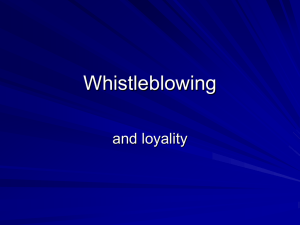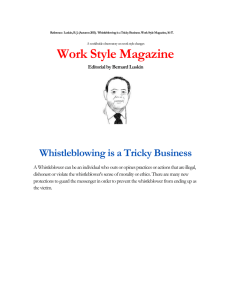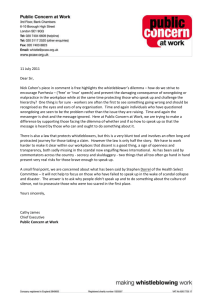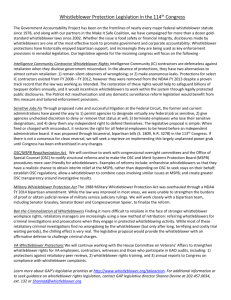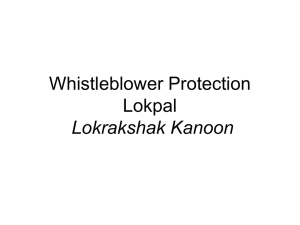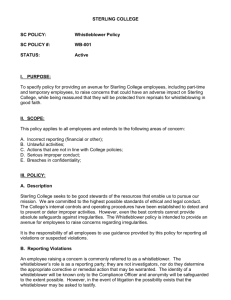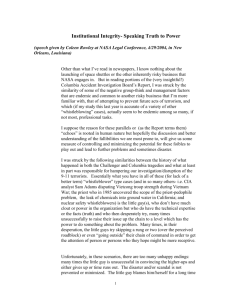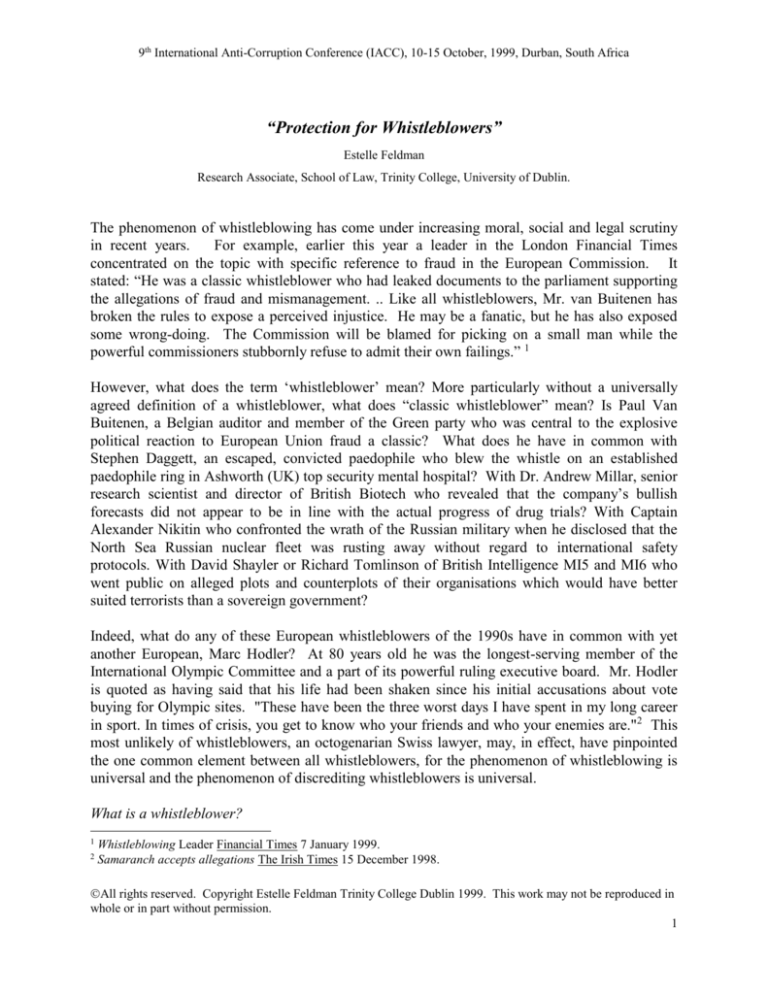
9th International Anti-Corruption Conference (IACC), 10-15 October, 1999, Durban, South Africa
“Protection for Whistleblowers”
Estelle Feldman
Research Associate, School of Law, Trinity College, University of Dublin.
The phenomenon of whistleblowing has come under increasing moral, social and legal scrutiny
in recent years.
For example, earlier this year a leader in the London Financial Times
concentrated on the topic with specific reference to fraud in the European Commission. It
stated: “He was a classic whistleblower who had leaked documents to the parliament supporting
the allegations of fraud and mismanagement. .. Like all whistleblowers, Mr. van Buitenen has
broken the rules to expose a perceived injustice. He may be a fanatic, but he has also exposed
some wrong-doing. The Commission will be blamed for picking on a small man while the
powerful commissioners stubbornly refuse to admit their own failings.” 1
However, what does the term ‘whistleblower’ mean? More particularly without a universally
agreed definition of a whistleblower, what does “classic whistleblower” mean? Is Paul Van
Buitenen, a Belgian auditor and member of the Green party who was central to the explosive
political reaction to European Union fraud a classic? What does he have in common with
Stephen Daggett, an escaped, convicted paedophile who blew the whistle on an established
paedophile ring in Ashworth (UK) top security mental hospital? With Dr. Andrew Millar, senior
research scientist and director of British Biotech who revealed that the company’s bullish
forecasts did not appear to be in line with the actual progress of drug trials? With Captain
Alexander Nikitin who confronted the wrath of the Russian military when he disclosed that the
North Sea Russian nuclear fleet was rusting away without regard to international safety
protocols. With David Shayler or Richard Tomlinson of British Intelligence MI5 and MI6 who
went public on alleged plots and counterplots of their organisations which would have better
suited terrorists than a sovereign government?
Indeed, what do any of these European whistleblowers of the 1990s have in common with yet
another European, Marc Hodler? At 80 years old he was the longest-serving member of the
International Olympic Committee and a part of its powerful ruling executive board. Mr. Hodler
is quoted as having said that his life had been shaken since his initial accusations about vote
buying for Olympic sites. "These have been the three worst days I have spent in my long career
in sport. In times of crisis, you get to know who your friends and who your enemies are."2 This
most unlikely of whistleblowers, an octogenarian Swiss lawyer, may, in effect, have pinpointed
the one common element between all whistleblowers, for the phenomenon of whistleblowing is
universal and the phenomenon of discrediting whistleblowers is universal.
What is a whistleblower?
1
2
Whistleblowing Leader Financial Times 7 January 1999.
Samaranch accepts allegations The Irish Times 15 December 1998.
All rights reserved. Copyright Estelle Feldman Trinity College Dublin 1999. This work may not be reproduced in
whole or in part without permission.
1
9th International Anti-Corruption Conference (IACC), 10-15 October, 1999, Durban, South Africa
In arriving at a reasonable definition of ‘whistleblower’, there is a further question. If somebody
encounters what he or she perceives to be a wrongdoing and discloses it, should this person
always be categorised as a whistleblower? If corrective action is taken without any undue
pressure on the one who discloses, nothing untoward of an external nature has affected this
person. In this circumstance the internal procedures have been effective. This is the desired
situation. The whistleblower comes to no harm and the organisation is enhanced. This lack of
conflict does not reflect the popular image of a whistleblower. Far more often than not, the
person disclosing is at risk, or the disclosure is ignored or denied. It is these individuals, who
persist in insisting that something is wrong in the face of adversity, who are most commonly
recognised by the term ‘whistleblower’.
Three Stages of Whistleblowing.
There are two inevitable stages in the process of whistleblowing. During the first stage,
Causation, a person perceives an activity as illegal, unethical, or immoral. The whistleblower can
choose to ignore this perception, to acquiesce in the conduct of the activity, to participate, to
object or to walk away. Over time these five choices are not mutually exclusive as an
individual’s mind may change as to how to behave at any given time. Irrespective of personal
conduct, there may be no option but to proceed to the second stage, Disclosure. In organisations
regulated by legislation, which includes all companies in democratic societies, there may be strict
rules requiring disclosure to the external regulator or auditor. Auditors and other compliance
officers are themselves under strict rules of disclosure. In situations of disclosure, the response
of some managements is to get rid of the problem, not by sorting out the revealed wrong, but by
sorting out the whistleblower. Thus, stage three of the whistleblowing process is Retaliation.
Disclosure is often by means of confidential information including documents, but even so the
whistleblower’s identity may not be obvious. Consequently, identification of the whistleblower
is a matter of extreme importance to the ‘wrongdoer’, and preserving anonymity is perhaps of
greater importance to the whistleblower.
Why blow the whistle and disclose corruption?
A person may disclose for any of the following reasons or combination of reasons. Depending
on one’s viewpoint, the whistleblower is considered heroic or heinous. On the positive side one
might suggest, principle, legal considerations and for the public good. On the negative side there
is disclosure for malicious reasons or as an informer. Finally, there is disclosure by the media.
1. Principle: In the first instance, people have become whistleblowers as a matter of principle
because of personally held ethical or moral beliefs. Indeed, in a study tracking sixty-four US
whistleblowers over a period of six years these people are referred to as “ethical resisters”. They
tend to be “conservative people devoted to their work and their organizations.” 3
2. Legal considerations: Second, people may blow the whistle for legal considerations. The
individual concerned may be in a regulatory function and is specifically required to obey the law
either by dint of their professional obligations or by dint of the terms of their employment. For
example, under companies’ legislation in most countries, registered auditors are placed under
3
M.P. and M.G. Glazer, The Whistleblowers (Basic Books New Jersey,1989). Quote at 5.
All rights reserved. Copyright Estelle Feldman Trinity College Dublin 1999. This work may not be reproduced in
whole or in part without permission.
2
9th International Anti-Corruption Conference (IACC), 10-15 October, 1999, Durban, South Africa
stringent obligations in relation to company audits; furthermore, employees of a company may be
required under legislation to inform registered auditors fully and openly not merely on what the
auditors require but on what they are entitled to require. International money laundering
regulations require disclosure to the relevant authorities by persons engaged in ‘property’ and
money transactions. These are merely examples of the many regulatory provisions now in force
in such areas as financial regulation, competition and, of course, the vast area of environmental
protection.
One might say that complying with such strict legislation is not particularly onerous on a person.
There is a view that law-abiding people believe that the law in its broadest sense should be
upheld. Consequently, it should be no great burden to obey the law in these matters. At the
other end of the scale, an individual will comply through fear of the personal consequences
arising from a failure to uphold the law once the wrongdoing becomes known. Certainly, the
forms of legislation mentioned contain criminal sanctions for breach of the law. Yet, on a
worldwide basis, we have returned to weekly, if not daily, allegations in the media of institutions
and professions which appear to have failed these expectations. It is worth mentioning that in
such situations, those who are totally law-abiding and compliant are in danger of being sullied by
association.
3. Public good: Finally, on the heroic side, is disclosure for the public good. Depending on
viewpoint this individual is either seen as good citizen or do-gooder cum crank. Possibly the
finest example was the very courageous action of Christopher Meili, the Swiss security guard,
who blew the whistle on the shredding of Swiss archive documents relating to the Holocaust
banking accounts. Meili lost his job and suffered significant condemnation for his act. Since
Meili had neither prior association with Holocaust victims nor any Jewish connections, his
whistleblowing is all the more indicative of a totally selfless act motivated by public interest.4
4. Ancillary motives: There are many reasons for blowing the whistle which might be described
as “ancillary motives”. This could include motivation for personal gain, some malicious end
such as revenge, or a destructive falling out of the concerned parties. They do not necessarily
involve male fides. To give an example from my own country, a family feud among the siblings
of a family with major business interests included High Court litigation. Whereas the family
settled out of court, during the civil dispute information became public knowledge which
implicated current and previous government ministers in the possible receipt of relatively large
sums of money. This led to the establishment by the Irish parliament of a judicial tribunal of
inquiry. This Tribunal found that payments had taken place but that no political favours had been
sought or received in return. The Tribunal also found large deposits of funds in offshore banks
presumably for tax avoidance purposes. Parliament has established a follow-on Tribunal of
Inquiry to investigate further into what the media has called the “golden circle”. It is widely
acknowledged that these revelations, affecting senior politicians, and hitherto highly esteemed
businesspersons and professionals, are a direct if unwitting result of a vicious row between
brothers and sisters of a non-political family.
See Guard who found Hitler’s gold The Guardian 14 November 1997.
All rights reserved. Copyright Estelle Feldman Trinity College Dublin 1999. This work may not be reproduced in
whole or in part without permission.
3
4
9th International Anti-Corruption Conference (IACC), 10-15 October, 1999, Durban, South Africa
5. Informer: Fifth, there is the informer as whistleblower. This is someone who is, say, a police
or regulatory authority’s informer. An informer can either be a plant placed in the organisation
for that purpose or a member of the organisation who has been ‘turned’ by the relevant authority.
One might think that we are now entering the language of crime and spy stories. However, there
is growing evidence of police forces, including the London Metropolitan Police, rooting out
corruption in this manner. In another example from home, the Irish parliament has established a
separate judicial inquiry into improprieties instigated by building contractors and developers in
the planning process. The media is filled with speculation that implicated witnesses have been
offered immunity from prosecution in return for complete disclosure to this Tribunal. Further,
one of the catalysts for this inquiry appears to have been the posting of a £10,000 bounty for
information leading to a conviction for planning corruption.
6. Media whistleblowers: Finally, there is the media as whistleblower. This includes the
journalist both as reporter when approached by an initiative of an organisational whistleblower
and the journalist as initiating investigator. For example, there have been many highly publicised
TV investigative current affairs programmes such as 60-minutes in the United States or World in
Action in the United Kingdom where investigative journalists have conducted research based
very much on material provided by a company employee.
At the more direct level of
investigative journalism, many will remember avidly reading reports from the Sunday Times(UK)
Insight Team whose finest hour may well have been in the early 70s with the Thalidomide
revelations which, of course, had worldwide impact.
Is whistleblower protection necessary?
Reference was made earlier to the lament of a recent whistleblower only three days into his
ordeal. The following experience from an American study is fairly typical of the long-term
impact of whistleblowing. In 1973 Joseph Rose became an in-house attorney for the Associated
Milk Producers in San Antonio, Texas. He discovered illegal contributions to the committee to
re-elect President Nixon. He reported his findings internally and was rejected. He knew that he
could be implicated in a criminal conspiracy as the Watergate saga was unfolding, but, equally,
disclosure could lay him open to charges of violating attorney /client privilege. Thirty-five years
old with five children and an ill wife, he was dismissed for raising his concerns, losing not only
his job and undermining his financial security, but also, he was deliberately isolated in the
community where his erstwhile employers had enormous influence. Having acted from ethical
and professional considerations, he was shunned by other attorneys and blacklisted across the
United States. Some years later he managed to establish a private practice and when a favourable
article about him appeared in the Wall Street Journal new clients sought him out. In 1987,
almost 15 years after his ethical activities, finally, he was offered a job by another corporation.5
WHISTLEBLOWER PROTECTION LEGISLATION
When reflecting on whistleblower protection particularly in relation to southern African
countries, it is useful to consider the situation in the United States of America and in the United
Kingdom. In the absence of domestic precedent, the courts of the English-speaking countries
normally follow the judgements of English common law. Even South Africa, which has
5
Glazer op.cit. see entry in Index at 285 for specific references to Rose, Joseph.
All rights reserved. Copyright Estelle Feldman Trinity College Dublin 1999. This work may not be reproduced in
whole or in part without permission.
4
9th International Anti-Corruption Conference (IACC), 10-15 October, 1999, Durban, South Africa
developed its own common law based on Roman-Dutch law, is not immune to the influences of
Commonwealth and other common law countries. Throughout the region, when new issues arise
in the courts, there is a judicial willingness to examine judgements of countries which follow the
English common law tradition.6
UNITED STATES
Much of the academic research on whistleblowers is based in the United States and shows that
despite Federal and State legislation that should offer protection, the whistleblower remains
exposed and isolated. Theoretically there is sophisticated Whistleblower Protection Legislation in
the United States. “The protection of whistleblowers has long been a serious problem for the
Federal Government. The Civil Service Reform Act of 1978 was expected to provide relief
against reprisal for blowing the whistle on mismanagement, waste, fraud and abuse in the Federal
Government. Unfortunately, the 1978 act was insufficient in protecting employees, and in 1989,
Congress passed the Whistleblower Protection Act of 1989 to further strengthen and improve the
protections for whistleblowers in the Federal Government.”7
Stated very briefly, the Office of Special Counsel (OSC) was established to aid a whistleblower
in having his or her disclosure investigated, in preserving anonymity in so far as is possible and,
in preventing retaliatory action against the whistleblower. In cases of retaliation the Office of
Special Counsel is supposed to aid in proceedings and ensure appropriate remedies and penalties.
The history of the office is a recital of failure to fulfil these ends. The first incumbent, Alex
Kozinski, “(u)sing the OSC’s own manual as a guide, .. taught a course for federal managers on
how to fire employees without OSC interference.”8
A witness at the 1993 Senate oversight
hearings on Whistleblower Protection, objecting to the reauthorization of the Office of Special
Counsel, stated that in the previous year, 11 out of 38 complainants had been the subjects of
unauthorised leaks of confidential information and in 1993, 10 out of 21 reported the same
finding. Moreover, when the Office of Special Counsel ruled against an employee, in 1992, 20
out of 21 complainants had no idea why and in 1993 the figure was 37 out of 38.9 This was the
evidence of the legal director of the Government Accountability Project (GAP). In 1977, this
non-profit organisation was created to protect the public interest and promote government and
corporate accountability by advancing occupational free speech, defending whistleblowers and
empowering citizen activists.
What of the non-federal employee? United States employment legislation is based on the
common law “employment-at-will” doctrine. Simply put, this means that, in law, an employer
6
The Honourable Mr. Justice Manyarara, retired Judge of Appeal in the Supreme Court of Zimbabwe, Protection of
Sources Media Law and Practice in Southern Africa Paper 2 (Media Institute of Southern Africa (MISA) 1996) at 2.
7
March 1993. Chairman’s opening remarks at the Congressional Oversight Hearing on Whistleblower Protection
and the Office of Special Counsel Committee on Post Office and Civil Service U.S. Government Washington 1994 at
1.
8
Devine and Aplin Whistleblower Protection – The Gap Between the Law and Reality 31 Howard L.J. 223 at 231
(1988).
9
H.R. 2970, To Reauthorize The Office Of Special Counsel And To Make Amendments To The Whistleblower
Protection Act Committee on Post Office and Civil Service U.S. Government Washington 1994 Evidence of Tom
Devine, legal director, Government Accountability Project at 28.
All rights reserved. Copyright Estelle Feldman Trinity College Dublin 1999. This work may not be reproduced in
whole or in part without permission.
5
9th International Anti-Corruption Conference (IACC), 10-15 October, 1999, Durban, South Africa
may dismiss an employee for any reason or for no reason at all; equally, an employee may leave
an employment for any reason or for no reason at all. Since the employer is very much the
dominant party to the employment contract, ‘equally’ is not really the appropriate word.
Nevertheless, this is the situation of the employee in the absence of being able to satisfy a court
that other contractual terms exist. It places a whistleblower in a precarious situation unless the
disclosure can be classified as a public policy exception to the employment-at-will doctrine. In
such a situation the disclosure, and the employee, are protected in law. However, these
exceptions vary from state to state and their application is quite inconsistent.10 In one case where
a bank employee was dismissed allegedly because he informed his employer that his immediate
supervisor was being investigated for embezzlement in another bank, a Californian court ruled
that this was a private not a public interest.11 Other instances where whistleblowers were denied
redress for wrongful or retaliatory discharge under the public policy exception rule include an
employee allegedly discharged for refusing to alter federal pollution control reports as ordered12
and an employee discharged for objecting to, and refusing to participate in, her employer’s
fraudulent billing of the City of New York for services never performed.13
The progress of a Colorado case outlines how difficult it can be for a whistleblower to pursue a
legal remedy. A supervisory employee with an advanced degree in mechanical engineering
engaged in research projects for the space shuttle programme was fired in 1975, allegedly for
repeatedly reporting to his own superiors substandard workmanship, overstated performance
claims, misappropriation of materials and budgeting discrepancies which constituted fraud by his
employers against the National Aeronautics Space Administration (NASA) and, hence, the US
government. A claim in tort for wrongful discharge was filed in 1981: the trial court entered a
directed verdict against the plaintiff ruling that Colorado did not recognise a claim for wrongful
discharge and that the claim was time-barred. On appeal, the Court of Appeals reversed the
verdict and remanded the case for new trial14 and an application by the defendant company for
certiorari was granted by the Colorado Supreme Court. In 1992 the Colorado Supreme Court
upheld the decision of the appeal court permitting the retrocative application of a judicial
decision because “it involved conduct that was clearly prohibited by federal law, because
retroactive application would further the purpose and effect of the public-policy exception to the
at-will employment doctrine, and because the equities favored retroactive application in order to
avoid penalizing [the plaintiff] for his responsible actions and releasing [the defendant company]
from any liability for its alleged tortious conduct.”15 As regards the merit of this particular
whistleblower, the Court held that the at-will employee had established a prima facie case of
wrongful discharge under public policy exception. There does not appear to be a report of a
retrial so it might be assumed that seventeen years after his wrongful discharge the whistleblower
and his erstwhile employers settled his action.
10
Atkins, The Whistleblower Exception to the At-Will-Employment Doctrine: An Economic Analysis of
Environmental Policy Enforcement 70:3 Denver University L. Rev. 537 at 546 (1993).
11
Foley v Interactive Data Corp., 765 P.2d 373(Cal.1988).
12
Trombetta v Detroit, Toledo & Ironton Railroad Co., 265 N.W. 2d 385 (Mich.Ct.App. 1978).
13
Remba v Federation Employment & Guidance Serv., 559 N.E. 2d 655 (N.Y. 1990).
14
Martin Marietta Corp. v Lorenz 823 P.2d 100 (Colo. 1992).
15
Id., at 104.
All rights reserved. Copyright Estelle Feldman Trinity College Dublin 1999. This work may not be reproduced in
whole or in part without permission.
6
9th International Anti-Corruption Conference (IACC), 10-15 October, 1999, Durban, South Africa
Qui Tam16
One piece of United States legislation which is extremely favourable to a whistleblower is the
Federal False Claims (Amendment) Act, 1986.17 Sometimes known as the Lincoln Law, this
legislation, which first came into force during the Civil War, was directed primarily at war
profiteers. Historically the qui tam lawsuit originated in the 13th century when private citizens
sought to protect the King’s interest.18 It was resurrected in the 19th century19 by federal
lawmakers primarily to combat the supply to the Union Army of arms crates filled with sawdust
rather than muskets, and the delivery of allegedly fit mules which were diseased, blind,
overpriced or had already been purchased (several times). In the absence of developed systems
of federal law enforcement machinery, the lawmakers sought to enlist the help of private citizens
to police and prevent such fraudulent activity.20 The statute was not used very effectively in later
years.
In the mid-1980s, following some high profile cases of fraud against the federal
government, the laws were dusted down. According to the United States Department of Justice,
over 2,000 cases have been filed since the amended statute came into effect with in excess of
$1.83 billion recovered by the government through qui tam civil suits. The two primary areas for
recovery are defence procurement and health care.
The qui tam, or whistleblower provisions of the False Claims Act, allow private individuals or
corporations with knowledge of fraud against the Federal Government to bring an action on
behalf of the United States and to receive, if successful, a percentage of the recovery. There is
no requirement that the plaintiff be directly involved as a victim of the fraud and tax fraud is
excluded. If the Government takes the suit, the relator may be entitled to recover between 15%
and 20% of the proceeds of the award or settlement. If the Federal Government declines the
action and does not participate the relator may take the action alone and, if successful, is entitled
to receive between 25% and 30% of the proceeds. A successful plaintiff may also be awarded
costs. The Act penalises the fraudulent body with monetary damages equalling three times the
amount of damages sustained by the Federal Government as well as fines of up to $10,000 for
each false claim. In order to be recognised as such, the relator must be an independent “original
source” of the information and must be able to show that this information could not have been
derived arising from prior public disclosure. The first reported qui tam action taken by a non-US
citizen for activities taking place outside the US involved a United Kingdom company supplying
16
Much of this section is based on Aron, Whistleblowers, Insubordination, and Employee Rights of Free Speech
Labor Law Journal April 211 (1992); The Civil False Claims Act Enlisting Citizens In Fighting Fraud Against The
Government A Report by Getnick, Neil V. and Skillen, Lesley A. for the Civil Prosecution Committee New York
State Bar Association , Commercial and Federal Litigation Section New York State May 1996; Bucy, Where To
Turn In A Post-Punitive Damages World: The “Qui Tam” Provisions of the False Claims Act The Alabama Lawyer
November 356 (1997).
17
Pub.L. 99-562, Oct. 27, 1986, 100 Stat.3153; 31 USCA § 3732
18
Qui tam pro domino rege quam pro se ipso in hac parte sequitur... who sues on behalf of the King as well as for
himself.
19
False Claims Act of 1863.
20
1986 United States Congressional hearings as quoted in Bucy op. cit. at 356b.
All rights reserved. Copyright Estelle Feldman Trinity College Dublin 1999. This work may not be reproduced in
whole or in part without permission.
7
9th International Anti-Corruption Conference (IACC), 10-15 October, 1999, Durban, South Africa
parts to the United States airforce; the case is reported to have been settled for a sum in excess of
£7 million.21
The general view is that the qui tam bounty provides the financial wherewithal by which fraud
can be brought to light. It offers the likelihood of compensation to people who could not afford
the risks to their careers and livelihood that becoming a whistleblower frequently entails.
Corporations and business people can also be compensated by qui tam actions where market
share has suffered as a result of fraudulent, anti-competitive and abusive practices in their
industry.
UNITED KINGDOM
The United Kingdom parliament has recently put into effect legislation for whistleblower
protection. Introduced initially as a Private Member’s Bill, the Public Interest Disclosure Act
199822 incorporates new provisions in the Employment Rights Act 1996. This statute will have
the effect of providing protection to the bona fide whistleblower. The necessity to act in good
faith and with reasonableness by the employee are positive critical aspects of the legislation.
Disclosures should be confined within the organisation whenever possible. Unlike the United
States, a disclosure is not protected if personal gain is involved.
There are three aspects of the Act worthy of particular commendation. Possibly the most
significant is that, in relation to protected disclosures, the legislation renders void the duty of
confidentiality that an employee is deemed to owe an employer, or any other ‘gagging’ clause
express or implied, that may be in a contract of employment. Thus, an employer against whom a
protected disclosure is made may not use the traditional weapon against the employee of suing
for breach of contract. A ‘protected’ or ‘qualifying disclosure’ means any disclosure of
information which, in the reasonable belief of the worker making the disclosure, tends to show
the commission of a criminal offence, breach of legal obligation, endangering the health and
safety of any individual, damaging the environment and the deliberate concealment of any
information relating to these. A disclosure is not protected if the person commits an offence by
making it.
Second, the Act protects disclosure of extra-territorial issues. This is particularly significant
given the global nature of many employment activities and the awesome power of multi-national
companies be they UK indigenous or with corporate headquarters outside the UK. Finally, it
establishes an employee’s right not to be subject to detriment for making a protected disclosure.
This is the sine qua non of such legislation. Where detriment is suffered the Act allows for full
civil damages. This is a departure from the usual practice in employment law where
compensation is capped.
TI settles US ‘whistleblower’ action for £7m Financial Times 28 July 1998; Whistleblower reward as British firm
settles The Guardian 31 July 1998.
22
Public Interest Disclosure Act 1998 (Chapter 23). The authorised Internet version is at
www.hmso.gov.uk/acts/acts1998/19980023.htm
21
All rights reserved. Copyright Estelle Feldman Trinity College Dublin 1999. This work may not be reproduced in
whole or in part without permission.
8
9th International Anti-Corruption Conference (IACC), 10-15 October, 1999, Durban, South Africa
The Act is quite clear in relation to the types of wrongdoing about which protected disclosures
may be made. Thus, poor management which for the purposes of discussion may be described as
incompetent or negligent (both in the non-legal sense) is excluded. There have been recent very
high profile problems of UK-based organisations where wrongdoing was not caught because of
inappropriate or inadequate management control.23 The initial failures of management cannot be
construed as against the law; however, very often there are people working in organisations who
become aware of, for instance, patterns of deliberate neglect and will not be heard internally
when they protest or try to highlight problems. Undoubtedly, this is a far more difficult area for
which to legislate. Nevertheless, the plight of potential good faith whistleblowers in these types
of circumstances should not be ignored.
Some of the thinking behind the Act is to move away from a culture of ‘blame’ to a culture of
‘support’. It is recommended that organisations introduce whistleblowing procedures and
policies so as to exclude the possibility of “protected disclosures”. At the forefront of
encouraging this culture change so that there will be no need for external disclosure is a recently
formed registered charity called Public Concern At Work (PCAW). Its objective is to “promote
good practice and compliance with the law across the public, private and voluntary sectors by
focusing on the accountability of those in charge and the responsibility of those who work. The
charity is wholly independent of Government”.24 PCAW is recognised as a legal advice centre
by the Bar Council and in the six years since its establishment has successfully advised many
whistleblowers. Dealing with 1,500 serious cases, PCAW has been involved in litigation on only
three occasions.
There is one significant flaw in the Act worth noting. No protection is provided by the new
statute in relation to breaches of the Official Secrets Act. The culture of secrecy and fear of
reprisal that this legislation has engendered is all pervasive. For instance, Lord Justice Phillips,
when he opened the BSE Inquiry25, advised that the Head of the Civil Service had given an
assurance that civil servants will not be disciplined for giving evidence or help to the inquiry.26
Surely one is entitled to expect that, of all people, civil servants would be under a duty to
cooperate fully with any judicial inquiry and be subject to disciplinary procedures for failing to
do so. Given that the BSE crisis is arguably one of the most damaging events of recent years in
respect of public health and of the UK economy, the remarks attributed here appear utterly at
odds with the aspirations of the Public Interest Disclosure Act. It remains the case that no
considerations of public interest can be balanced in defence of a breach of the Official Secrets
Act 198927 which protects information relating to security, international relations, defence and
criminal investigations. However, where public servants are subject to punitive secrecy
legislation the culture will never encourage the exposure of corruption. This is equally true for
non-government employees. Since access to information is at the root of open government, of
23
Public Interest Disclosure Act 1998 (Chapter 23) Sweet & Maxwell Current Law Statutes Explanatory
Background note to legislation referring to Zeebrugge ferry tragedy (the Herald of Free Enterprise) and Barings
Bank collapse.
24
From the preface to reports published by Public Concern at Work established in 1993.
25
Mad Cow Disease which is known as CJD and fatal when contracted by humans.
26
Inquiry Opens with Chairman Seeking to Reassure Whistleblowers.” Financial Times 28 January 1998.
27
This Act repealed the 1911 Official Secrets Act.
All rights reserved. Copyright Estelle Feldman Trinity College Dublin 1999. This work may not be reproduced in
whole or in part without permission.
9
9th International Anti-Corruption Conference (IACC), 10-15 October, 1999, Durban, South Africa
transparency and of accountability, all of which impact on the private sector, a culture of secrecy
in the public service is at odds with the entire concept of promoting these ideals.28
SOUTH AFRICA
This paper is presented during the week in which the Parliamentary Justice and Constitutional
Committee of South Africa’s National Assembly is holding hearings on the Open Democracy
Bill. There is a whistleblower protection section contemplated in that Bill. I was privileged to
spend the latter part of last week in Pretoria and Cape Town, together with Guy Dehn, Director
of the UK’s Public Concern at Work, meeting with representatives of various South African
interest groups of both a public and private business nature discussing these matters.29 It is
pertinent to refer to some of the issues highlighted in relation to whistleblower protection
legislation. One of the great strengths of the UK legislation is that it is based on accountability,30
it covers all forms of employment and, by the manner in which it encourages internal disclosure,
it will effectively penalise authoritarian managements who stifle potential whistleblowers.
Universal concern was expressed that the South African Bill as it stands only extends protection
to the public sector. It also seems that protection for disclosing internally, the key thrust of the
UK legislation, may well be absent. Certain statutory entities such as the Public Protector and
the Human Rights Commission are specified as bodies to whom a protected disclosure may be
made; there appears to be no requirement on these legal persons to act to rectify the malpractice
nor is it clear how the whistleblower is to be protected by these bodies. Furthermore, by creating
a specific listing of a handful of bodies in the legislation, more appropriate regulators such as, for
instance, a transport regulator or an inspector of mines may be excluded. The remedy for
victimisation lies in the High Court, a legal process which is extremely costly and extremely time
consuming. It has been recommended that redress in the Courts should be considered only as a
last resort and that it would be more in keeping with current South African procedures to
introduce a more proximate mediator between the whistleblower and the organisation.
Conclusion
In conclusion, it is important to reflect on the impact of retaliation and victimisation on a person
who, in good faith, is thrust into the role of whistleblower. It must be one of the most selfdestructive processes imaginable.
“The extraordinary stress of spending every waking moment in this world, where reality has been
inverted, is bound to inflict enormous damage on the individual's health, mental and physical.
The longer the fight continues, the greater is the harm experienced and there is no doubt that it is
a devastating and dysfunctional experience. The campaign to discredit may result in individuals
suffering periods where there is an almost total erosion of self. After all, how many of us could
withstand a continuous devaluing of our person and denial of respect for our achievements and
28
See generally Martin and Feldman, Access to Information in Developing Countries (Transparency International,
Berlin, 1998)
29
The author wishes to acknowledge the cooperation and support of Ms. Lala Camerer of the Institute of Security
Studies (ISS) and Mr. Richard Calland of the Institute for a Democratic South Africa (IDASA) who sponsored and
organised these meetings.
30
The United States Whistleblower Protection legislation is based on the constitutional right to free speech.
All rights reserved. Copyright Estelle Feldman Trinity College Dublin 1999. This work may not be reproduced in
whole or in part without permission.
10
9th International Anti-Corruption Conference (IACC), 10-15 October, 1999, Durban, South Africa
maintain self-esteem or, indeed, sense of self? No matter how many people say "Hang on in
there" and "Don't give up", they are not the ones exposed to institutional anger and an
organisation that is ready to pounce on the slightest error. Perhaps this is the ultimate paradox for
the whistleblower to deal with: condemned on the one hand for highlighting an error that the
organisation will not admit to, and condemned on the other for committing far less serious errors
forced by the consequences of this self same condemnation.”31
As the management abuses continue the whistleblower becomes more and more vulnerable to
making mistakes and it becomes less likely that a satisfactory solution will be forthcoming from
within. To support the whistleblower in any form the organisation would have to be seen to
condemn the actions that were taken by members of management who may well be too senior for
even the mildest censure. Justice is neither done nor seen to be done and somehow defending the
indefensible becomes the preferred course of action. Inevitably the whistleblower is denied the
equity and justice required for the complete restoration of name and reputation. This form of
cover-up is seldom recognised as being ethically and morally wrong. The fact that quite often it
may also result in defending the commission of illegal acts is a matter of indifference. It seems
irrelevant to many top managements that, in their bid to discredit a whistleblower, giving tacit
approval to the deliberate distortion of fair procedures not only signals approval of the wrongful
activity against the whistleblower. They are also sending explicitly clear signals to their
organisation that truth and honesty are not valued. The campaign to discredit and demean the
whistleblower, based as it is in lies and deceit, is not only exceptionally injurious to the
individual but it is also likely to be very destructive of the organisation.
Without an understanding of these realities there cannot be effective whistleblower protection.
Procedures and legislation that are introduced to protect whistleblowers ought to encourage
disclosure within the organisation. The organisation is best served by a non-confrontational form
of whistleblowing and the whistleblower is best served by ensuring adequate protection to
minimise the possibility of retaliation.
Acknowledgement: The author thanks Mr. Guy Dehn, Director of Public Concern at Work, for his generosity in
sharing his knowledge and expertise in the preparation of this paper.
END
Feldman, as quoted in the Dail [Irish Parliament] by Deputy P. Rabbitte T.D. [M.P.] proposer of the Republic of Ireland’s
Whistleblower Protection Bill 1999. Second Stage. Dail Debates (preliminary) 15 June 1999. 230.
See also Feldman, Fear of the Whistleblower – the legacy of Auschwitz The Furrow September 490 (1995).
31
All rights reserved. Copyright Estelle Feldman Trinity College Dublin 1999. This work may not be reproduced in
whole or in part without permission.
11

